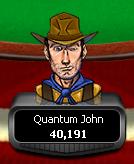Protest of Electronic Voting Machines
This morning, February 12, 2008, I appeared at my polling place in Mosby Elementary School to cast my vote in the Democratic presidential primary, but refused to use the electronic voting machines, due to their inherent unreliability. The chief and assistant chief of the poll determined that this circumstance (my claim that the machines are unreliable) was not clearly covered by their rule books, so they phoned the Fairfax County Electoral Board. After they spoke to officials there, a County official also spoke to me by phone. After a lengthy discussion, the official on the phone spoke to the assistant chief of the poll and authorized me to submit a provisional paper ballot, although they were unable to assure me that my vote would be counted. They further explained that I have the right to appear before the County Electoral Board at Noon tomorrow at the Fairfax County Government Center, Room 315-C, to defend my ballot.
I will appear before the board and base my case on Virginia Code 24.2-642, which begins, “When any voting or counting device becomes inoperative in whole or in part while the polls are open…”, and the fact that it is impossible to know if the voting computer is recording all votes accurately.
My position is that there are only two ways for a person to know that an electronic voting machine is accurately recording votes and thereby fully operational. 1. Have the voting machine produce a paper record that allows each voter to confirm that their vote is accurately recorded on the paper record and use those paper records to validate the records and tabulations of the voting machine, or 2. Have a person who understands every line of code in the software and both the original and current condition of every physical circuit in the computer hardware verify that no errors can occur. In the first case, the use of a voting machine is rendered moot except that unvalidated election results can be produced very quickly. The second case is not humanly possible, and even if it were, we should not trust our election results to any single person.
Official reasons I have heard for the use of electronic voting machines are: 1. They save money, 2. They provide rapid results, and 3. They count more accurately than people counting paper ballots. Unofficial reasons, I suspect, include overly optimistic marketing presentations of the companies who manufacture voting machines, which gloss over the systemic flaws in the voting machine concept.
The fundamental purpose of an election is to provide citizens with the ability to elect representatives by popular, anonymous votes, and there must be a method by which ordinary citizens can validate all votes, otherwise our elections are vulnerable to errors serious enough to effect the outcomes of elections, whether those errors are intentional or unintentional. The purpose of an election is not to save money nor to provide rapid results.
Saving money and providing rapid results should only be considered for methods that improve voting systems that meet the fundamental purposes of elections, which must include the possibility of comprehensive verification. A claim that voting machines count more accurately than people is not true in the case of machines without voter-validated paper trails, because without voter-validated paper trails, it is impossible to know the accuracy of the voting machines' records. The executives and technicians at the voting machine companies say, "Trust us." I, for one, will not.
For these reasons, I will never again use a voting machine that does not include a paper record that allows me to verify that my vote was correctly recorded, so that the rapid-tabulation systems can be verified. I will continue to appear at my polling place in every election and request either a fully auditable system or a paper ballot.
John Lambert
Fairfax, VA
For further reading:
UPDATE: 2/13/2008
Well, I got to defend my ballot with the Fairfax County Electoral Board, and it was a fun experience. They had 3 voting members for this process and 2 advisors, and they were all intelligent, reasonable people who were focused on following the rules to ensure the integrity of the election. Excellent! It was determined that the person who authorized me to complete a provisional ballot should not have done so, as the rules provided those only for people who were not in the polling book, but contended that they should have been in the book, not for people who wanted a paper ballot because of any other reason. Well, the rules for the Board are different from the rules at the poll, so the issue was now different. One voting member took the position that I was eligble to vote, and they had my sealed vote, so they should count it. Another took the position that I shouldn't have received the provisional ballot in the first place, so it should not be counted. The third's position was that I was trying to "strong-arm" a way to use a paper ballot, when the rules did not provide for that (which was correct), so he was opposed to counting my vote. Then they asked the advisors about precedents and were told that this issue has arisen in the past, and the votes were counted. Based on that insight, they all agreed to count my vote.
The best thing, though, is that when I inquired about how I could pursue moving Virginia away from non-voter validated voting systems, they told me that it had already been done. Last year (I probably missed this in my research because it was so recent), the Virginia Legislature passed a law that all new voting equipment must include the option to process paper ballots. And there will be at least four in use in Fairfax County this November. (And they said that they would make sure that one of those machines was in my precinct!)




No comments:
Post a Comment